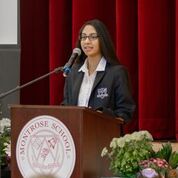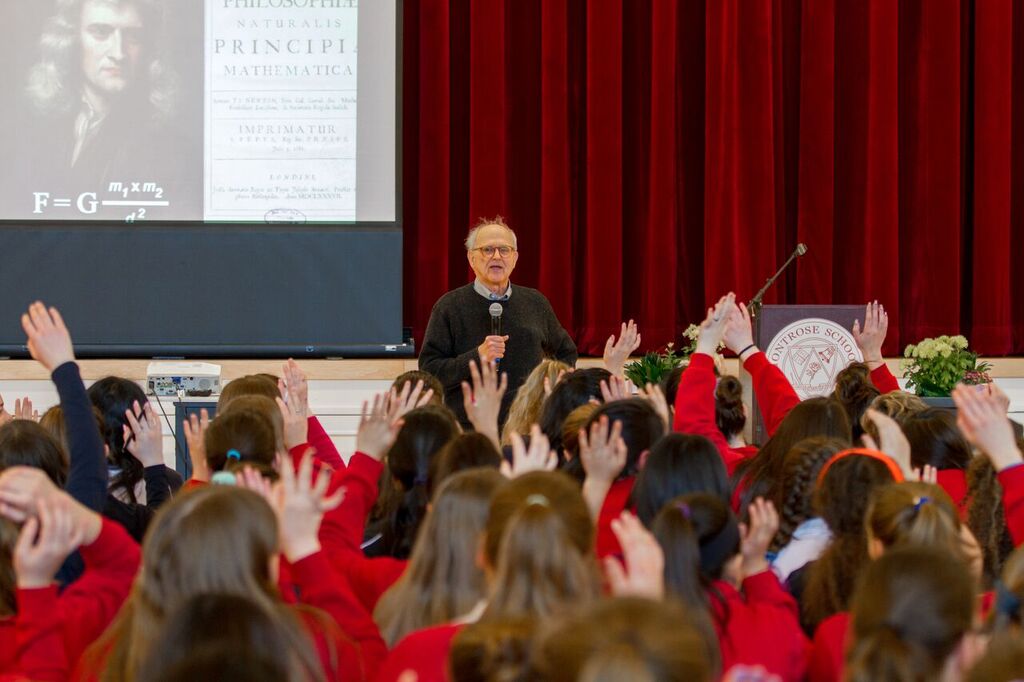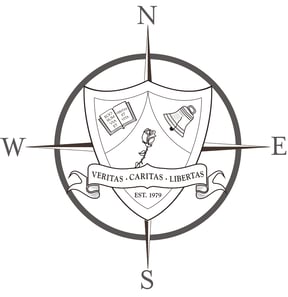Editor's note: In spring of 2018, Nobel-Prize winning physicist Dr. Rainer Weiss visited Montrose and spoke to students. Senior Anneka Ignatius '18 introduced him, highlighting the intellectual virtues that propelled his success. Here is a copy of her remarks.
To complete the work of Albert Einstein demands tenacity and patience. Dr. Rainer Weiss possesses plenty of both.
 In Capstone class, the seniors first learned of Dr. Weiss as an example of a modern-day individual who embraces theoria, or knowing for the sake of knowing.
In Capstone class, the seniors first learned of Dr. Weiss as an example of a modern-day individual who embraces theoria, or knowing for the sake of knowing.
Co-recipient of the 2017 Nobel Prize in Physics and Professor Emeritus at Massachusetts Institute of Technology (MIT), Dr. Weiss led a team that detected gravitational waves for the first time. Associate Head of School, Mrs. Elrod, invited Dr. Weiss to speak this year because he exemplifies the Aristotelian desire to know.
Fascinated by Dr. Weiss, I delved into an Internet rabbit hole exploring his work and personal anecdotes. The number of colleagues, friends, and family members who highlighted Dr. Weiss’s humility and authenticity moved me. While I cannot relate to his level of genius, I believe the minutiae I gathered about his willingness to help people and desire to understand the universe resonated most deeply.
Still, I needed to learn more about the implications of Dr. Weiss’s work with gravitational waves; thus, I turned to Montrose’s resident astrophysics expert, Ms. Thordarson. Ms. Thordarson graduated from Columbia University with a degre
e in astrophysics, so she kindly described Dr. Weiss’s research in layman’s terms for me. Essentially, a gravitational wave is a ripple in spacetime. While most people believe they live in a three dimensional world, we actually exist in four dimensions of spacetime.
From moving your hand through the air to rolling a basketball on a rubber sheet, you make waves in the fabric of “spacetime.” Einstein theorized these waves existed long ago, but the technology of his time limited him. Dr. Weiss and his team developed the Laser Interferometer Gravitational-Wave Observatory (LIGO), an L-shaped building that measures changes in distance as gravity waves stretch and compress spacetime. Currently, this observatory only detects large gravitational waves, such as ones created by two black holes or neutron stars colliding. Dr. Weiss’s team affirmed part of Einstein’s theory of relativity, but much more remains to be discovered. Still, LIGO empowers humanity to start investigating the universe and its fundamental laws in a new cosmic light.
Overall, I believe Montrosians should approach the intellectual pursuits that interest them with the same dedication Dr. Weiss applies to physics. Physics describes how the world operates and how reality behaves, but what interests you?
From writing prose inspired by your favorite novels to comparing governmental regimes to working on a biology lab, the horizon for men and women with a desire to know seems endless. Dr. Weiss’s life seems to echo the words of the late Isaac Newton: “If I have seen further than others, it is by standing upon the shoulders of giants.”
Despite unlocking a secret of the universe, Dr. Weiss continues to serve as a beacon of intellectual humility. His work inspires me to strive for answers to life’s questions, scientific or otherwise, in their purest form.






